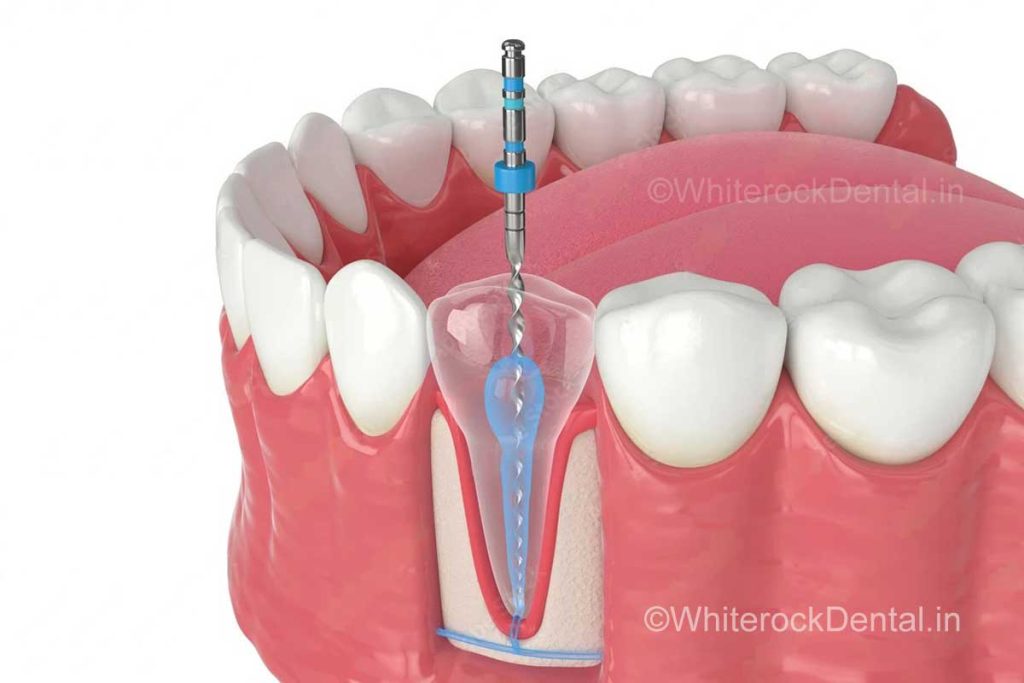
Cracked Tooth? Why a Root Canal Might Be Your Quickest Rescue
Have you ever chomped down on something hard, only to feel a sudden sharp pain in one of your teeth? If so, you might be dealing with a cracked tooth—a common dental issue that can escalate quickly if not addressed promptly. But don’t worry! Dr Pauravi Hegde MDS is here to explain why a root canal might be your best and quickest solution to save that cracked tooth, especially if you’re living in the bustling Mumbai suburbs of Sewri, Dadar, Matunga, Ghatkopar, or Antop Hill.
I. Introduction
Context & Relevance to Mumbai Suburbs
Living in a fast-paced city like Mumbai means juggling work, family, and countless other responsibilities. Whether you’re navigating the crowded streets of Sewri, the lively markets of Dadar, the educational hubs of Matunga, the vibrant lanes of Ghatkopar, or the residential areas of Antop Hill, finding time for regular dental checkups can be a challenge. This often leads to dental issues like cracked teeth being ignored until they cause significant pain or complications.
Purpose of the Article
This article aims to shed light on why a root canal might be the quickest and most effective way to rescue a cracked tooth. We’ll explore what a root canal involves, its benefits, and why it often makes more sense than other treatment options. Plus, I’ll share some real-life stories from my practice to illustrate how timely intervention can save your tooth and your smile.
II. Understanding the Basics of Root Canals
What Is a Root Canal?
A root canal is a dental procedure designed to save a tooth that’s severely decayed or infected. The process involves removing the infected or inflamed pulp—the soft tissue inside the tooth that contains nerves and blood vessels. After cleaning and disinfecting the canals, they are sealed to prevent further infection. Often, a crown is placed on the tooth to restore its strength and functionality.
Goal: Save the tooth by removing the problematic pulp.
Outcome: Preserve your natural tooth structure and relieve pain.
Why It’s Performed
Root canals are recommended when:
- Deep Decay: A cavity has penetrated deeply into the tooth, reaching the pulp.
- Cracks or Trauma: A tooth has been cracked or damaged from biting something hard or from an accidental injury.
- Large Fillings: Extensive restorations can stress the tooth, leading to pulp damage.
I remember a patient from Ghatkopar who came in after accidentally biting into a hard popcorn kernel. She was terrified she’d lost her tooth forever, but after a quick root canal, we were able to save it and restore her smile beautifully.
Typical Procedure Steps
- Local Anesthesia: Ensures you won’t feel pain during the procedure.
- Pulp Removal & Cleaning: The infected pulp is carefully removed, and the canals are thoroughly cleaned and disinfected.
- Filling & Sealing: The canals are filled with a rubber-like material called gutta-percha to seal them.
- Crown or Final Restoration: A crown is placed to protect the tooth and restore its function.
III. Debunking the Nerve Damage Myth
Why the Concern About Nerve Damage?
One of the most common fears surrounding root canals is the risk of nerve damage. People often hear alarming stories about facial numbness or permanent nerve damage, which understandably causes anxiety. But how much of this is true?
Anatomy Insights
The pulp chamber houses the tooth’s own nerves and blood vessels, not the major nerves that control facial movements. When a root canal is performed, only the pulp of that specific tooth is treated. Modern dental techniques ensure that surrounding nerves remain unaffected.
Rare Complications vs. Common Misconceptions
While no procedure is entirely risk-free, nerve damage from a root canal is extremely rare. Complications might occur if the procedure is not performed correctly, such as overfilling the canal or missing a canal entirely. However, these instances are uncommon, especially when handled by an experienced dentist like Dr Pauravi Hegde MDS.
IV. Real Risks Associated With Root Canals
Temporary Discomfort or Sensitivity
After a root canal, it’s normal to experience some mild discomfort or sensitivity for a few days. This is part of the healing process and usually subsides quickly. Over-the-counter painkillers or prescribed medications can help manage any lingering soreness.
I had a patient from Matunga who was initially worried about the pain, but she found the procedure less painful than she had feared. The discomfort only lasted a couple of days, and she was back to her usual self in no time.
Infection or Re-Infection
While root canals have a high success rate, there is a small chance of infection recurring if the canals aren’t sealed properly or if new decay develops. This underscores the importance of follow-up visits and maintaining good oral hygiene after the procedure.
Tooth Fracture
Removing the pulp can weaken the tooth structure, making it more susceptible to fractures. This is why placing a crown or a similar restoration after a root canal is crucial—it provides the necessary support to protect the tooth from breaking.
Allergic Reactions or Rare Complications
Allergic reactions to certain materials used in the procedure are possible but incredibly rare. If you have known allergies, it’s essential to inform your dentist beforehand so alternative materials can be used.
V. Why Root Canals Are Safer Than You Think
Advancements in Dentistry
Modern dentistry has made root canals safer and more efficient than ever before. Techniques like rotary endodontics allow for more precise cleaning and shaping of the canals, while digital imaging ensures accurate diagnosis and treatment planning. Improved anesthesia and sedation options also make the procedure more comfortable for patients.
High Success Rates
Root canals boast success rates exceeding 90% when performed correctly. With proper aftercare, a root canal-treated tooth can last a lifetime, preserving your natural bite and smile.
Less Invasive Than Extraction
Choosing a root canal over extraction means you retain your natural tooth structure, which is essential for maintaining jawbone density and facial structure. Extracting a tooth can lead to shifting of adjacent teeth, bite misalignment, and more expensive dental work like implants or bridges down the line.
VI. The Dentist’s Perspective: Ensuring a Safe Procedure
In-Depth Examination
Before performing a root canal, Dr Pauravi Hegde MDS conducts comprehensive diagnostic tests, including digital X-rays or CBCT scans, to map out the canal structure precisely. This thorough examination helps in identifying any anatomical challenges that might complicate the procedure.
Local Anesthesia & Patient Comfort
Ensuring patient comfort is a top priority. The area is numbed effectively, and for those with dental anxiety, sedation options like nitrous oxide or oral sedatives can make the experience much more relaxed.
Sterile Environment & Skill
A clean, sterile environment is crucial to prevent infections. Using sterilized tools and adhering to strict hygiene protocols ensures the procedure is safe. The expertise and experience of the dentist play a significant role in minimizing risks and ensuring a successful outcome.
Post-Procedure Guidance
After a root canal, Dr Pauravi Hegde MDS provides detailed aftercare instructions. This includes maintaining good oral hygiene, avoiding hard foods initially, and attending follow-up appointments to monitor healing and plan for final restoration, like a crown.
VII. What to Do if You’re Still Anxious
Consult a Specialist
If the idea of a root canal still makes you uneasy, consider consulting an endodontist—a dentist who specializes in root canals. Their extensive experience and specialized training can provide additional reassurance and expertise.
Ask Questions
Don’t hesitate to ask your dentist any questions you might have about the procedure. Understanding each step can alleviate fears and help you feel more in control of your dental health.
Request a Second Opinion
Seeking a second opinion can provide peace of mind, especially if you’re unsure about the recommended treatment. Another professional perspective can reinforce the necessity and safety of a root canal.
Explore Anxiety Management Techniques
For those with intense dental anxiety, techniques like mindfulness, breathing exercises, or listening to calming music during the procedure can help. Some clinics also offer sedation options to ensure you remain relaxed throughout the treatment.
VIII. Conclusion
Recap of Key Points
- Root canals effectively treat the tooth’s own nerve without affecting major facial nerves.
- Temporary discomfort post-procedure is normal and manageable.
- Modern techniques make root canals safe, efficient, and highly successful.
- Major nerve damage from root canals is exceedingly rare and often based on myths.
Reassurance
If you’ve been hesitant about getting a root canal due to fears of nerve damage, rest assured that the real risk lies in ignoring the underlying issue. Treating a cracked tooth with a root canal not only relieves pain but also preserves your natural tooth, preventing further complications and more invasive treatments in the future.
Call to Action
Living in Mumbai’s busy suburbs doesn’t mean you have to compromise on your oral health. If you suspect you have a cracked tooth, don’t wait for the pain to escalate. Schedule a consultation with Dr Pauravi Hegde MDS or a trusted local dentist in Sewri, Dadar, Matunga, Ghatkopar, or Antop Hill. Early intervention can save your tooth and keep your smile bright and confident.
Final Thought
A root canal can be your best ally in saving a cracked tooth. With the right dentist, modern technology, and proper aftercare, you can overcome fears and maintain a healthy, beautiful smile. Don’t let myths deter you from seeking the dental care you need—embrace the advancements in dentistry and take proactive steps to preserve your natural teeth.
Thank you for reading, and here’s to a healthier, happier smile!
Disclaimer:
This article is intended for informational purposes only and does not replace professional dental advice. Always consult a qualified dentist—like Dr Pauravi Hegde MDS—to evaluate your specific dental needs and treatment options. Individual cases can vary, so a personalized diagnosis is crucial for the best outcome.


WhiteRock Dental Clinic
807 B, Lodha Supremus, New Cuffe Parade, Wadala East, Mumbai 400037, India
All content on this blog is copyright © 2024 by whiterockdental.in. Unauthorized reproduction or distribution is prohibited. For inquiries, please contact us via our website.
